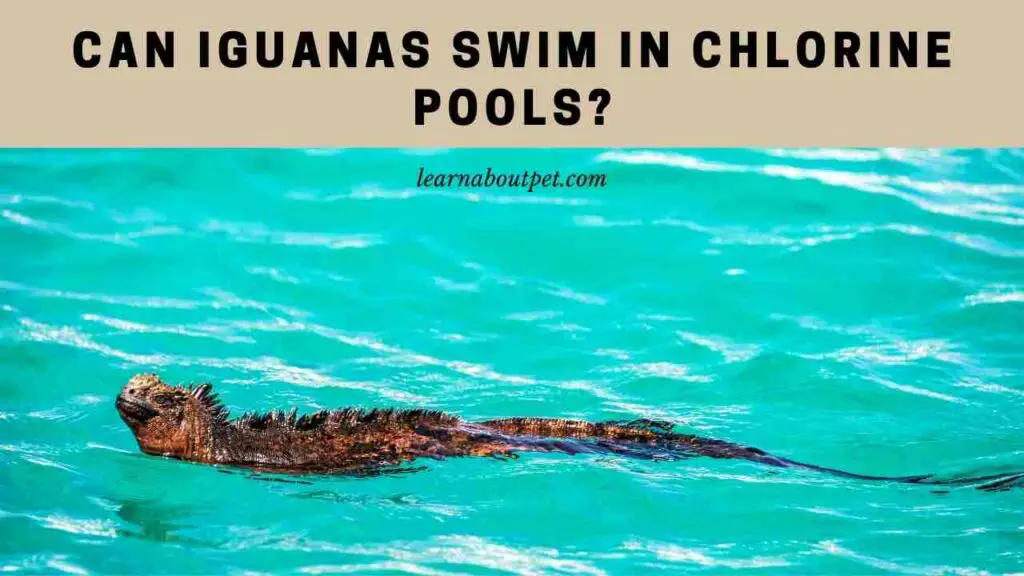Having an iguana as a pet is trending all over. Even though many people find iguanas boring, in reality, iguanas are very fast and fascinating creatures. With exceptionally strong jaws and eyesight, they are unlike any other pets. They can climb trees and swim. When it comes to swimming iguana owners may ask the following questions
Can iguanas swim in chlorine pools? Yes, the iguana can swim in a chlorine pool but putting iguanas in a pool in which chlorine was just added isn’t recommended. To put it in simple words, iguana swimming in chlorine water isn’t suggested but it is doable.
An iguana is a large lizard that looks like a dragon. It has a crest made up of large thorns on its back. This dorsal ridge starts from its head and goes down to its tail. In the world, there are more than 600 species of iguanas. However, owning an iguana can be a really hard task.

Iguana owners know what it takes to pet these little but amazing creatures. Petting iguanas is a different kind of experience than petting any other domestic animal. But the owners do wonder if they should let their lizard pet slither in the water or not and if so, what precautions should be taken into consideration.
Do Iguanas Swim In Pools?
Yes, Iguanas like swimming. Swimming helps iguanas moisten their skin, which helps the iguanas to prevent skin irritation, cracks and infection. Besides being efficient swimmers, iguanas are also very good climbers. In their natural habitat iguanas climb to safeguard themselves from being attacked.
It is recommended that Iguanas should have an area where they can swim so that swimming can prevent boredom and it is a good exercise.
Iguanas are very clever pets and they can climb the nearby tree to the owner’s swimming pool and drop themselves into the pool. However, this behavior should be avoided as it can harm your pet. Putting a steel fence can prevent this behaviour.
Do Iguanas Play With Owners In Pool?
Iguanas are very interesting pets. Iguanas do recognize their owners and many iguanas like to play in the water with their owners. However, owners should understand that holding iguanas or trying to control iguanas in the pool is not recommended as iguanas can get frustrated.
Iguanas consider swimming as one a playful activity, which they want to do independently and without any restriction. Leave the iguanas on their own, as they can swim very well.
Can Iguanas Swim In Chlorine Pools?
Can iguanas swim in chlorinated pools? Yes, iguanas can swim in chlorine water and there is no harm to the iguana’s life except for the situation when chlorine was just added to the pool. Putting iguana in a pool that has chlorinated water which has gone through filters many times will not have any effects on the iguanas.
Iguana owners should try to put their pets in saltwater rather than putting them in chlorine water but that doesn’t mean that chlorine water is bad for the iguanas, except for the situation where chlorine was just added in the pool.
Is Chlorine Dangerous For Iguanas?
Does pool chlorine kill iguanas? Can Iguanas Swim In Chlorine Pools? If the iguana has eaten the chlorine then it is a serious issue and the owner should take their pet to the vet as soon as possible but if talking of chlorine in the pool then it won’t have any effect on iguanas.
Just to be fully assured, owners should rest the pool water for some time after adding chlorine. Iguana owners should also keep an eye on swimming iguanas and keep on checking if the iguana is showing any unfamiliar signs.
Many iguanas drink the water they swim in. Even though many iguanas swim in chlorinated water, owners should double-check of recent acid treatment of the pool and avoid adding iguanas in acid-treated pools.
Can Iguanas Poop In Pool?
Yes, Iguanas are more likely to poop in the pool. Not only their poop in the pool is dangerous but it smells horrible and even chlorine can’t work efficiently to hide the smell off. Iguanas poop can spread infections among humans, so iguana owners should avoid getting in the same pool when Iguanas are swimming.

If the owners are swimming their baby Iguanas then the risk of iguana feces in pool increases as baby Iguanas eat more than the adult iguanas so baby iguanas can poop more than adult iguanas. However, iguana poop either baby or adult is dangerous to humans. Hence it should be avoided to swim with iguanas.
Is Poop Of Iguanas Poisonous?
While many people consider iguana’s poop to be poisonous but in reality that is a myth. However, that doesn’t conclude that iguana’s feces isn’t hazardous. Many Iguanas carry bacteria in their gut that sheds with their feces which can spread diseases like salmonellosis and botulism among humans.
Is iguana poop in pool dangerous? Yes, iguanas poop in the pool is dangerous So, Humans should keep their distance from iguana’s poop and the owners should clean the iguana’s poop by taking precautions.
Should Iguanas And Owners Have A Common Pool?
Even though swimming in the common pool with your iguanas is fine, owners should understand that it is unhygienic to some level and risky. As feces of iguanas may spread infections, it is recommended to bathe the iguana separately.
Iguanas feces can lead to diseases like salmonellosis which can cause health ailments in humans. So it is recommended that iguanas and their owners should swim separately.
They might also try to dig and damage the bottom surface of the pool, so make sure your Iguana behaves well in the pool.
Best Way To Swim Iguanas
The best way to make iguanas swim is by buying the pet a small Children’s air pool. In an air pool owners can also add salt, which is recommended, in the water. The risk related to chlorine also goes away. In the air pool even if iguanas poop then it can be cleaned by taking precautions and it also decreases the risk dramatically.
Providing the iguana with a separate pool will make the iguana swim more freely and without discomfort. It will also provide iguanas with the space they need. The owners can also add artificial plants in the pool to give iguanas a real experience of swimming in the pond.
When buying a children’s air pool, owners should try to buy a pool that has long walls and add water only to half the pool, this way owners will secure iguanas from falling out of air pools.
Final Verdict – Can Iguanas Swim In Chlorine Pools
Petting iguanas can be a satisfactory experience but iguana owners often get confused and ask do iguanas swim in pools? or if they should let their iguanas swim. If iguanas can swim in the pool then can iguanas swim in chlorine pools? Yes, iguanas can swim in swimming pools and that too in chlorine pools, if the pools are chlorinated for a long time.

Even though iguanas can swim, owners should beware of the fact that putting iguanas in swimming pools can lead to iguanas pooping in the pool which can cause the spread of disease among humans. Even though the myth goes that iguana’s poop is Poisonous isn’t true but their poop should be cleaned by taking precautions.
The best way iguana owners can make their pets swim is by purchasing their iguanas at a children’s air pool. Air pools are comparatively cheaper and hygienic options to choose from. Having a separate pool will help iguanas to swim individually in peace and help their owners to avoid any infections.
As a pet lover, make sure to learn about pet more and give your pet iguana a good and comfortable life!

Welcome to Learn About Pet. My name is Rajkumar Ravichandran and I love all pets, travel, and amazing food. I write about my passion and personal experience caring for multiple pets in this blog! ❤️
Post Disclaimer
DISCLAIMER: THIS BLOG OR WEBSITE, "Learn About Pet", DOES NOT PROVIDE YOU WITH MEDICAL ADVICE AND IS NOT A SUBSTITUTE FOR MEDICAL ADVICE. ALWAYS GET IN TOUCH WITH YOUR PERSONAL VETERINARIAN AND USE INFORMATION HERE AS GENERAL ADVICE.
The information, including but not limited to, text, graphics, images and other material contained on this website are for informational purposes only. No material on this site is intended to be a substitute for professional veterinary advice, food recommendation, diagnosis, or treatment. Always seek the advice of your veterinarian or other qualified health care provider with any questions you may have regarding a medical condition or for pet food related questions.







